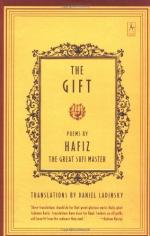|
This section contains 629 words (approx. 2 pages at 400 words per page) |

|
The Gift: Poems by the Great Sufi Master Summary & Study Guide Description
The Gift: Poems by the Great Sufi Master Summary & Study Guide includes comprehensive information and analysis to help you understand the book. This study guide contains the following sections:
This detailed literature summary also contains Topics for Discussion and a Free Quiz on The Gift: Poems by the Great Sufi Master by Hafez.
Hafizappears in throughout
Hafiz is a poet in fourteenth-century Persia in the Sufi tradition that encompassed Gnosticism, the wisdom schools of Pythagoras and Plato as well as many of the principals and formulations of Islam. He was schooled in the traditional medieval tradition, which meant he studied Koranic law and theology, grammar, mathematics and astronomy. On his own, he studied calligraphy, which was the only permitted art in the Islamic world at the time, since it could be used to transcribe and preserve the Koranic law. His acquaintance with the Koran, a book he memorized as a child, alongside his love for and intimate love of poetry, which was also celebrated in his childhood hometown of Shiraz, allowed him to find employment as a royal poet and college professor.
His poetry was fruit of the poetic tradition of the day, but also raw and intimate on a level that was unfamiliar, and that earned him exile from the more fundamentalist regimes as rulers changed over the course of his life. For that reason, his poetry exists along a spectrum of metaphor, sometimes speaking in completely clear language about God, and sometimes disguising him in metaphors as a kind merchant, a lover, an uncle, and various elements of nature in order to keep his poetry available to the people of Persia.
Godappears in Throughout
Rather than being contained by strict theological definitions, the God presented in Hafiz's poetry is bigger and more creative in His benevolence than can be contained by any definition. For that reason, Hafiz dedicates whole poems to the task of pointing out the ways in which organized religion divides God, cuts Him into parts, leaving others out, and limits in that way the number of people and needs they invite Him to address. According to Hafiz, God is playful, inviting people to equally playful and abandoned, undignified worship. He is affectionate, sending notes of His affection by way of nature, trial, and the people around. He is seductive, and as intimate a lover as any one might find on earth under any definition.
Hafiz refers to God as several things throughout, including poems in which God is metaphorically represented as an intimate friend, a lover, a brother, a spouse, a teacher, the sun, a merchant, an uncle, a teacher, and love itself. At the same time, God is also presented as the un-containable, undefinable and omnipotent Master of universes, and the object of every life's quest, whether consciously recognized as such or not.
Ralph Waldo Emersonappears in Preface
Read Hafiz in German in the 1800s, and did several of his own translations into English. Then in 1858, he wrote "Essays on Persian Poetry" and called Hafiz a poet for poets.
Goetheappears in Preface
Wrote the 1819's "The West-Eastern Divan," including "The Book of Hafiz" in which he praises Hafiz's poetry and spiritual insight and calls himself Hafiz's twin.
Queen Victoriaappears in Preface
Consulted Hafiz's poetry like an astrological guide.
H. Wilberforce Clarkeappears in Preface
Wrote the most respected English translation of Hafiz's poetry, first published in India in 1891, and used as a consulted work in the translation Ladinsky presents here.
Henry Mindlinappears in Introduction
Writes the introduction to the book, laying out the history of Hafiz's life.
Meher Babaappears in Preface, Introduction
A Zoroastrian master whose intense respect and affection for Hafiz's poetry made it a major part of his own teaching. He told students that "the love poetry of Hafiz contained all the secrets of the spiritual path — for the true subject matter of spirituality is love."
Sir William Jonesappears in Preface
Wrote one of the first English translations of Hafiz's poetry, published in 1771.
Rumiappears in Preface, Introduction
Another master poet and teacher in a Sufi school.
Muhammed Attarappears in Introduction
Hafiz's spiritual mentor.
Read more from the Study Guide
|
This section contains 629 words (approx. 2 pages at 400 words per page) |

|




